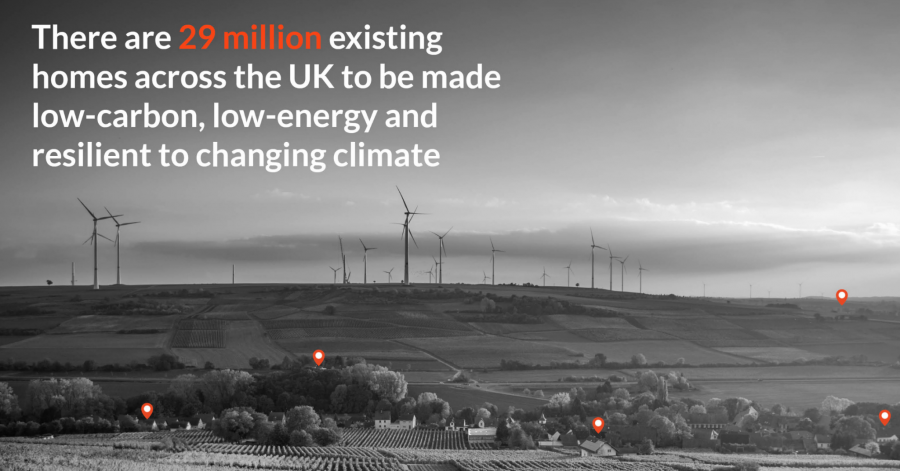
A major consortium including half of the social landlords in Wales has won £7m Welsh Government funding to deliver an optimised retrofit programme across more than 1,300 Welsh homes.
The collaboration of 68 partners, including 26 social housing providers, and managed by Sero, has been awarded more than £7m by Welsh Government to deliver a pioneering programme that, as well as decarbonising more than 1,370 Pathfinder homes, will create the tools required to roll out the large scale decarbonisation of homes across Wales.
The Optimised Retrofit approach will deliver a whole house, pragmatic route to decarbonising existing homes. The pathfinder programme will use a combination of building fabric improvements, low and zero carbon technologies (such as solar panels, battery storage and heat pumps), and intelligent ongoing operational controls, to take each home to its lowest achievable carbon footprint.
The approach is designed to support incremental home upgrades over multiple steps, in a coordinated way. The scheme enables delivery of a more comprehensive level of genuine zero carbon, typically for less cost, by supporting and aligning with the decarbonisation of the energy grids that will take place over the coming decades. This complexity is then rationalised into a simple ‘Zero Carbon by…’ forecast year – the year that individual home is expected to achieve net zero operational carbon emissions.
As well as social housing providers, this large-scale collaboration of partners includes a range of research, innovation, academic, technology, energy and industry organisations from across the UK. Alongside providing supplier and employment opportunities across Wales, these will lead supporting activities such as cutting-edge research, training and upskilling, and establishing frameworks for the retrofit industry, to enable the Welsh economy to become a true leader in decarbonisation.
Representing over half the social housing stock in Wales, the Optimised Retrofit collaboration will use the Pathfinder homes to refine a range of digital tools that enable each home to be easily and quickly surveyed, and ‘Pathways to Zero’’ carbon identified. This includes forecasting the year that each home will achieve zero carbon, based on the recommended stepped improvements, as the grid becomes greener.
Following the completion of the Optimised Retrofit Pathways programme, these digital tools will be made available to Welsh social housing providers, academia, government, and subsequently private homeowners. This will enable the long-term delivery of a legacy of tools, skills, frameworks and an evidence base that will allow others to follow and enable the decarbonisation of Wales’ homes to quickly gain scale and pace.
Talking about the project, Andy Sutton, cofounder of Sero that is managing the consortium said:
“Despite the acute problem of the pandemic, the Climate Emergency and Biodiversity Crisis are a chronic condition that remains existential for Wales and our world. Carbon emissions from home life represent up to 40% of total emissions in the UK – and compared to aviation, farming and heavy industry, this large part of our carbon footprint can be resolved here and now.
“Sero is already delivering, either on our own or with development partners, hundreds of new homes that are zero carbon, or that will automatically become zero carbon in the near future as the grid decarbonises. Optimised Retrofit turns our attention to the 1.4m existing homes in Wales, and 29m in the UK, to provide effective, practical pathways to bring these homes to zero. The collaboration will address barriers across a broad spectrum to transform residential decarbonisation from a high-level good intention into a reality for the homes of Wales.”
Andrew Bateson, Director of Assets and Investments at Cadwyn said:
“Cadwyn are delighted to be part of this innovative programme that will see the start of a step change in reducing Carbon emissions and help our tenants reduce their energy costs.”
The funding has been awarded through the Welsh Government’s Optimised Retrofit Programme that was introduced this year as part of the Innovative Housing Programme, to help reduce the carbon footprint of existing social housing in Wales, make energy bills more manageable for residents and provide new job and training opportunities.





